Contemporary Hospitality Industry
VerifiedAdded on 2023/01/11
|10
|2538
|29
AI Summary
This report explores the contemporary hospitality industry, including the different types of businesses within the industry, the range of operational and functional departments, and the contribution of the industry to the local, national, and international economy. It also discusses the interrelationship between operational and functional units, the use of franchising and licensing agreements, and the impact of skill gaps on the hospitality business.
Contribute Materials
Your contribution can guide someone’s learning journey. Share your
documents today.
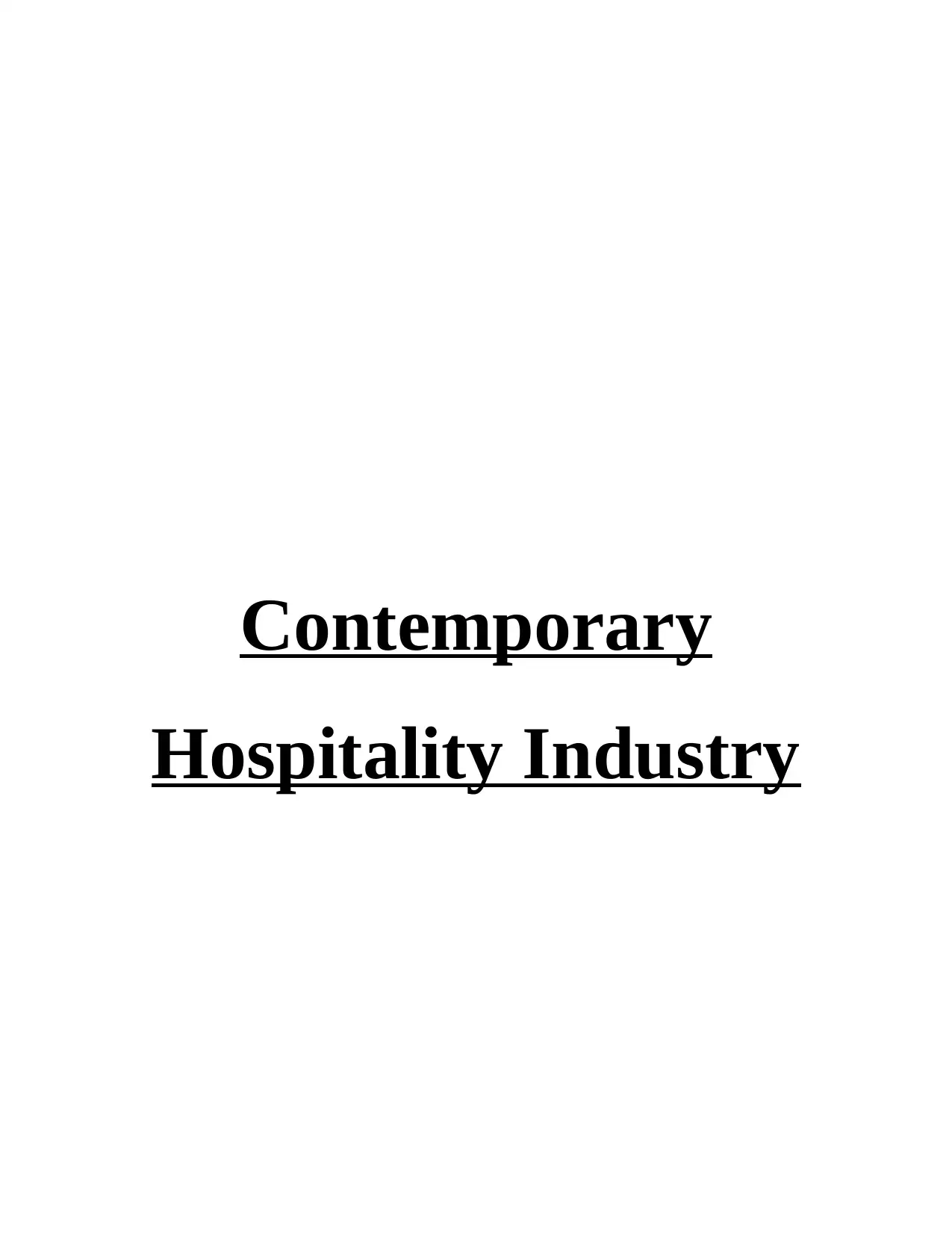
Contemporary
Hospitality Industry
Hospitality Industry
Secure Best Marks with AI Grader
Need help grading? Try our AI Grader for instant feedback on your assignments.
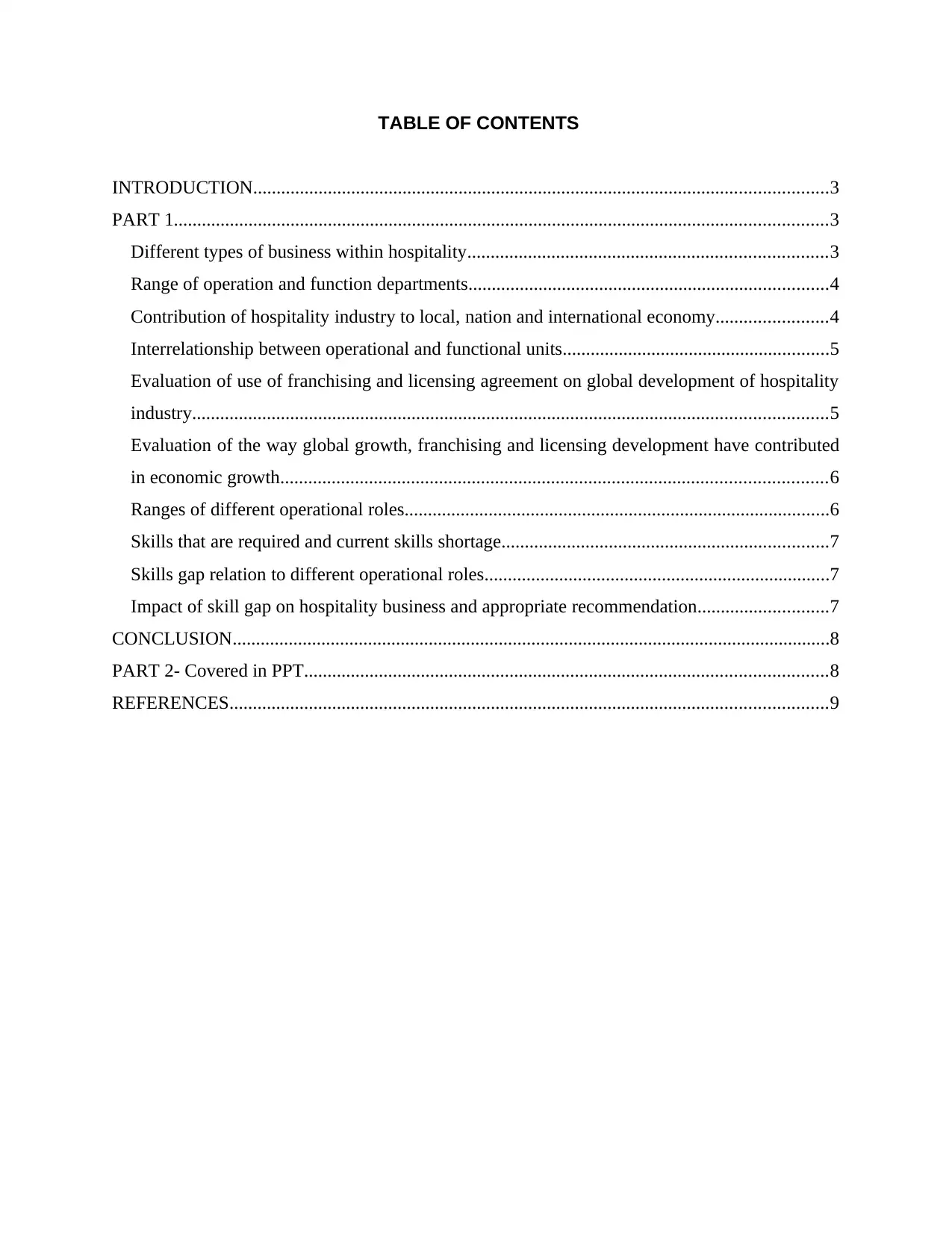
TABLE OF CONTENTS
INTRODUCTION...........................................................................................................................3
PART 1............................................................................................................................................3
Different types of business within hospitality.............................................................................3
Range of operation and function departments.............................................................................4
Contribution of hospitality industry to local, nation and international economy........................4
Interrelationship between operational and functional units.........................................................5
Evaluation of use of franchising and licensing agreement on global development of hospitality
industry........................................................................................................................................5
Evaluation of the way global growth, franchising and licensing development have contributed
in economic growth.....................................................................................................................6
Ranges of different operational roles...........................................................................................6
Skills that are required and current skills shortage......................................................................7
Skills gap relation to different operational roles..........................................................................7
Impact of skill gap on hospitality business and appropriate recommendation............................7
CONCLUSION................................................................................................................................8
PART 2- Covered in PPT................................................................................................................8
REFERENCES................................................................................................................................9
INTRODUCTION...........................................................................................................................3
PART 1............................................................................................................................................3
Different types of business within hospitality.............................................................................3
Range of operation and function departments.............................................................................4
Contribution of hospitality industry to local, nation and international economy........................4
Interrelationship between operational and functional units.........................................................5
Evaluation of use of franchising and licensing agreement on global development of hospitality
industry........................................................................................................................................5
Evaluation of the way global growth, franchising and licensing development have contributed
in economic growth.....................................................................................................................6
Ranges of different operational roles...........................................................................................6
Skills that are required and current skills shortage......................................................................7
Skills gap relation to different operational roles..........................................................................7
Impact of skill gap on hospitality business and appropriate recommendation............................7
CONCLUSION................................................................................................................................8
PART 2- Covered in PPT................................................................................................................8
REFERENCES................................................................................................................................9
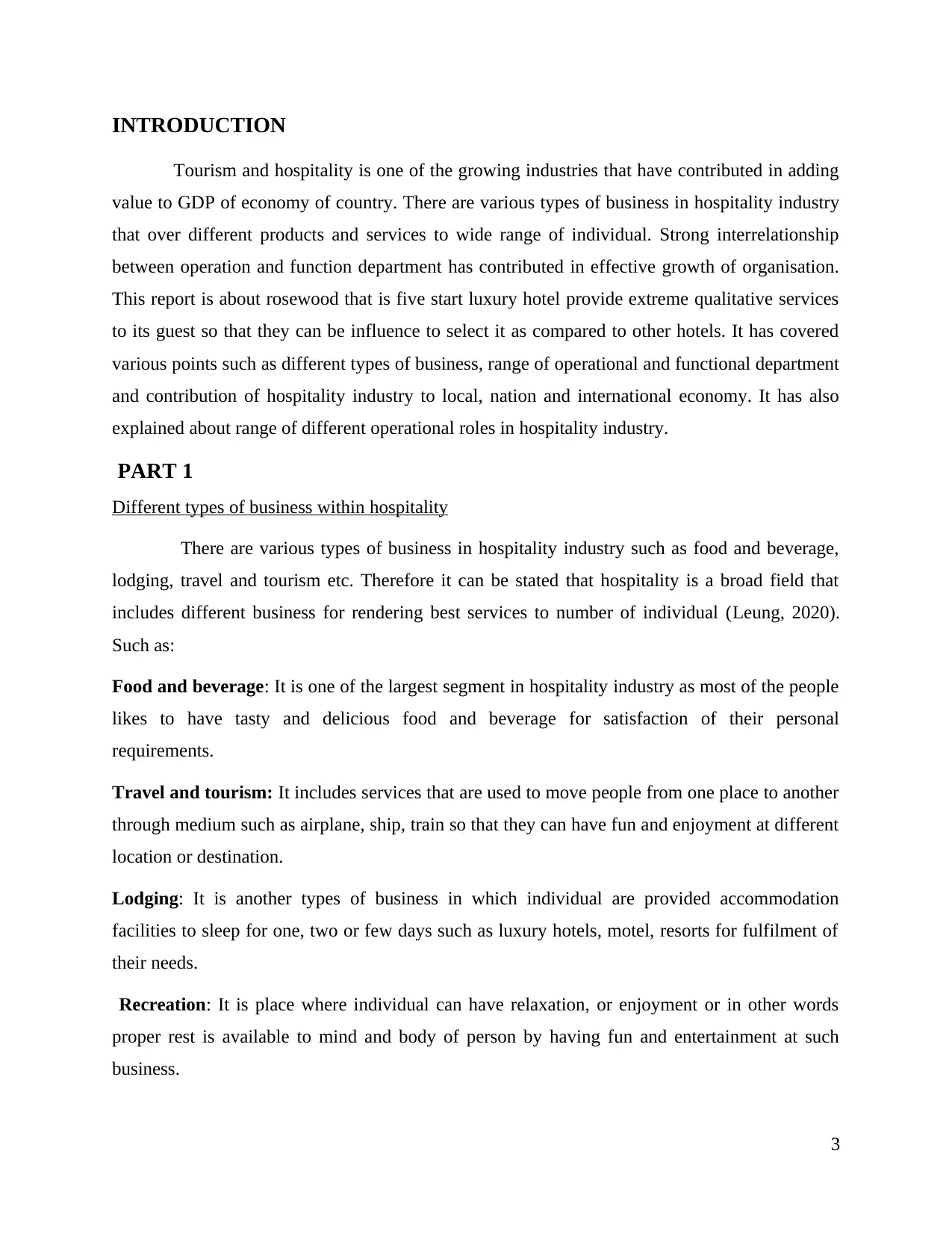
INTRODUCTION
Tourism and hospitality is one of the growing industries that have contributed in adding
value to GDP of economy of country. There are various types of business in hospitality industry
that over different products and services to wide range of individual. Strong interrelationship
between operation and function department has contributed in effective growth of organisation.
This report is about rosewood that is five start luxury hotel provide extreme qualitative services
to its guest so that they can be influence to select it as compared to other hotels. It has covered
various points such as different types of business, range of operational and functional department
and contribution of hospitality industry to local, nation and international economy. It has also
explained about range of different operational roles in hospitality industry.
PART 1
Different types of business within hospitality
There are various types of business in hospitality industry such as food and beverage,
lodging, travel and tourism etc. Therefore it can be stated that hospitality is a broad field that
includes different business for rendering best services to number of individual (Leung, 2020).
Such as:
Food and beverage: It is one of the largest segment in hospitality industry as most of the people
likes to have tasty and delicious food and beverage for satisfaction of their personal
requirements.
Travel and tourism: It includes services that are used to move people from one place to another
through medium such as airplane, ship, train so that they can have fun and enjoyment at different
location or destination.
Lodging: It is another types of business in which individual are provided accommodation
facilities to sleep for one, two or few days such as luxury hotels, motel, resorts for fulfilment of
their needs.
Recreation: It is place where individual can have relaxation, or enjoyment or in other words
proper rest is available to mind and body of person by having fun and entertainment at such
business.
3
Tourism and hospitality is one of the growing industries that have contributed in adding
value to GDP of economy of country. There are various types of business in hospitality industry
that over different products and services to wide range of individual. Strong interrelationship
between operation and function department has contributed in effective growth of organisation.
This report is about rosewood that is five start luxury hotel provide extreme qualitative services
to its guest so that they can be influence to select it as compared to other hotels. It has covered
various points such as different types of business, range of operational and functional department
and contribution of hospitality industry to local, nation and international economy. It has also
explained about range of different operational roles in hospitality industry.
PART 1
Different types of business within hospitality
There are various types of business in hospitality industry such as food and beverage,
lodging, travel and tourism etc. Therefore it can be stated that hospitality is a broad field that
includes different business for rendering best services to number of individual (Leung, 2020).
Such as:
Food and beverage: It is one of the largest segment in hospitality industry as most of the people
likes to have tasty and delicious food and beverage for satisfaction of their personal
requirements.
Travel and tourism: It includes services that are used to move people from one place to another
through medium such as airplane, ship, train so that they can have fun and enjoyment at different
location or destination.
Lodging: It is another types of business in which individual are provided accommodation
facilities to sleep for one, two or few days such as luxury hotels, motel, resorts for fulfilment of
their needs.
Recreation: It is place where individual can have relaxation, or enjoyment or in other words
proper rest is available to mind and body of person by having fun and entertainment at such
business.
3
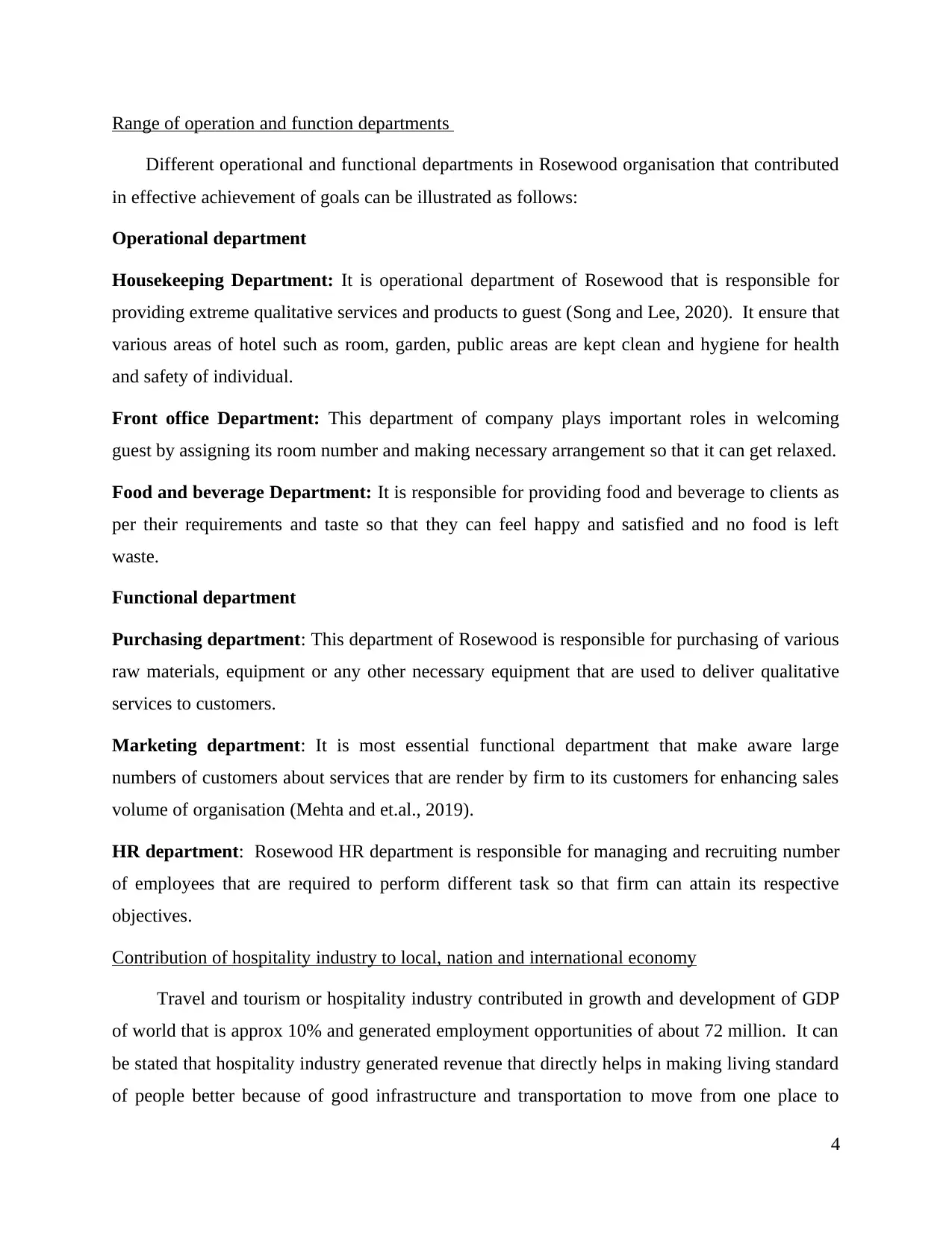
Range of operation and function departments
Different operational and functional departments in Rosewood organisation that contributed
in effective achievement of goals can be illustrated as follows:
Operational department
Housekeeping Department: It is operational department of Rosewood that is responsible for
providing extreme qualitative services and products to guest (Song and Lee, 2020). It ensure that
various areas of hotel such as room, garden, public areas are kept clean and hygiene for health
and safety of individual.
Front office Department: This department of company plays important roles in welcoming
guest by assigning its room number and making necessary arrangement so that it can get relaxed.
Food and beverage Department: It is responsible for providing food and beverage to clients as
per their requirements and taste so that they can feel happy and satisfied and no food is left
waste.
Functional department
Purchasing department: This department of Rosewood is responsible for purchasing of various
raw materials, equipment or any other necessary equipment that are used to deliver qualitative
services to customers.
Marketing department: It is most essential functional department that make aware large
numbers of customers about services that are render by firm to its customers for enhancing sales
volume of organisation (Mehta and et.al., 2019).
HR department: Rosewood HR department is responsible for managing and recruiting number
of employees that are required to perform different task so that firm can attain its respective
objectives.
Contribution of hospitality industry to local, nation and international economy
Travel and tourism or hospitality industry contributed in growth and development of GDP
of world that is approx 10% and generated employment opportunities of about 72 million. It can
be stated that hospitality industry generated revenue that directly helps in making living standard
of people better because of good infrastructure and transportation to move from one place to
4
Different operational and functional departments in Rosewood organisation that contributed
in effective achievement of goals can be illustrated as follows:
Operational department
Housekeeping Department: It is operational department of Rosewood that is responsible for
providing extreme qualitative services and products to guest (Song and Lee, 2020). It ensure that
various areas of hotel such as room, garden, public areas are kept clean and hygiene for health
and safety of individual.
Front office Department: This department of company plays important roles in welcoming
guest by assigning its room number and making necessary arrangement so that it can get relaxed.
Food and beverage Department: It is responsible for providing food and beverage to clients as
per their requirements and taste so that they can feel happy and satisfied and no food is left
waste.
Functional department
Purchasing department: This department of Rosewood is responsible for purchasing of various
raw materials, equipment or any other necessary equipment that are used to deliver qualitative
services to customers.
Marketing department: It is most essential functional department that make aware large
numbers of customers about services that are render by firm to its customers for enhancing sales
volume of organisation (Mehta and et.al., 2019).
HR department: Rosewood HR department is responsible for managing and recruiting number
of employees that are required to perform different task so that firm can attain its respective
objectives.
Contribution of hospitality industry to local, nation and international economy
Travel and tourism or hospitality industry contributed in growth and development of GDP
of world that is approx 10% and generated employment opportunities of about 72 million. It can
be stated that hospitality industry generated revenue that directly helps in making living standard
of people better because of good infrastructure and transportation to move from one place to
4
Secure Best Marks with AI Grader
Need help grading? Try our AI Grader for instant feedback on your assignments.
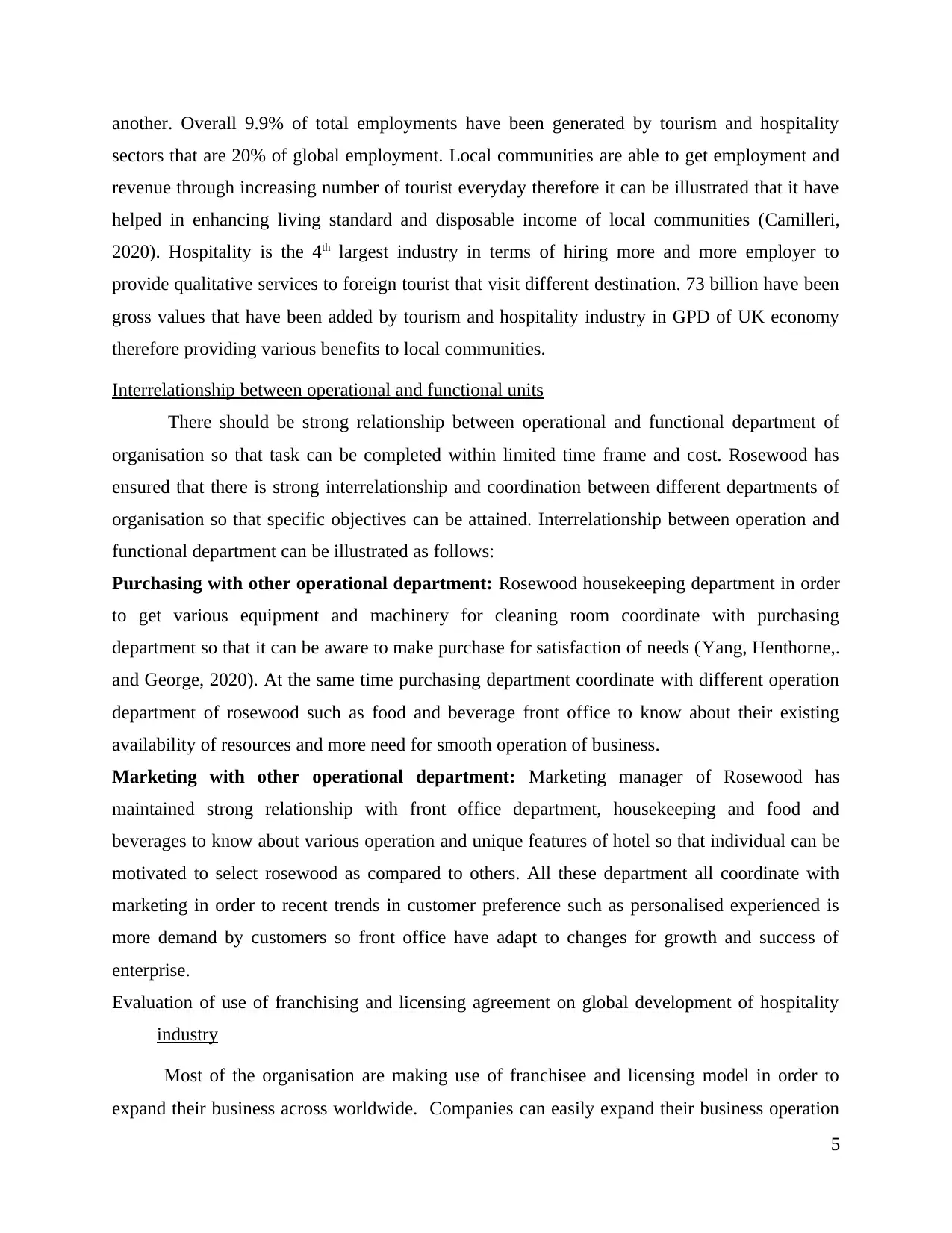
another. Overall 9.9% of total employments have been generated by tourism and hospitality
sectors that are 20% of global employment. Local communities are able to get employment and
revenue through increasing number of tourist everyday therefore it can be illustrated that it have
helped in enhancing living standard and disposable income of local communities (Camilleri,
2020). Hospitality is the 4th largest industry in terms of hiring more and more employer to
provide qualitative services to foreign tourist that visit different destination. 73 billion have been
gross values that have been added by tourism and hospitality industry in GPD of UK economy
therefore providing various benefits to local communities.
Interrelationship between operational and functional units
There should be strong relationship between operational and functional department of
organisation so that task can be completed within limited time frame and cost. Rosewood has
ensured that there is strong interrelationship and coordination between different departments of
organisation so that specific objectives can be attained. Interrelationship between operation and
functional department can be illustrated as follows:
Purchasing with other operational department: Rosewood housekeeping department in order
to get various equipment and machinery for cleaning room coordinate with purchasing
department so that it can be aware to make purchase for satisfaction of needs (Yang, Henthorne,.
and George, 2020). At the same time purchasing department coordinate with different operation
department of rosewood such as food and beverage front office to know about their existing
availability of resources and more need for smooth operation of business.
Marketing with other operational department: Marketing manager of Rosewood has
maintained strong relationship with front office department, housekeeping and food and
beverages to know about various operation and unique features of hotel so that individual can be
motivated to select rosewood as compared to others. All these department all coordinate with
marketing in order to recent trends in customer preference such as personalised experienced is
more demand by customers so front office have adapt to changes for growth and success of
enterprise.
Evaluation of use of franchising and licensing agreement on global development of hospitality
industry
Most of the organisation are making use of franchisee and licensing model in order to
expand their business across worldwide. Companies can easily expand their business operation
5
sectors that are 20% of global employment. Local communities are able to get employment and
revenue through increasing number of tourist everyday therefore it can be illustrated that it have
helped in enhancing living standard and disposable income of local communities (Camilleri,
2020). Hospitality is the 4th largest industry in terms of hiring more and more employer to
provide qualitative services to foreign tourist that visit different destination. 73 billion have been
gross values that have been added by tourism and hospitality industry in GPD of UK economy
therefore providing various benefits to local communities.
Interrelationship between operational and functional units
There should be strong relationship between operational and functional department of
organisation so that task can be completed within limited time frame and cost. Rosewood has
ensured that there is strong interrelationship and coordination between different departments of
organisation so that specific objectives can be attained. Interrelationship between operation and
functional department can be illustrated as follows:
Purchasing with other operational department: Rosewood housekeeping department in order
to get various equipment and machinery for cleaning room coordinate with purchasing
department so that it can be aware to make purchase for satisfaction of needs (Yang, Henthorne,.
and George, 2020). At the same time purchasing department coordinate with different operation
department of rosewood such as food and beverage front office to know about their existing
availability of resources and more need for smooth operation of business.
Marketing with other operational department: Marketing manager of Rosewood has
maintained strong relationship with front office department, housekeeping and food and
beverages to know about various operation and unique features of hotel so that individual can be
motivated to select rosewood as compared to others. All these department all coordinate with
marketing in order to recent trends in customer preference such as personalised experienced is
more demand by customers so front office have adapt to changes for growth and success of
enterprise.
Evaluation of use of franchising and licensing agreement on global development of hospitality
industry
Most of the organisation are making use of franchisee and licensing model in order to
expand their business across worldwide. Companies can easily expand their business operation
5
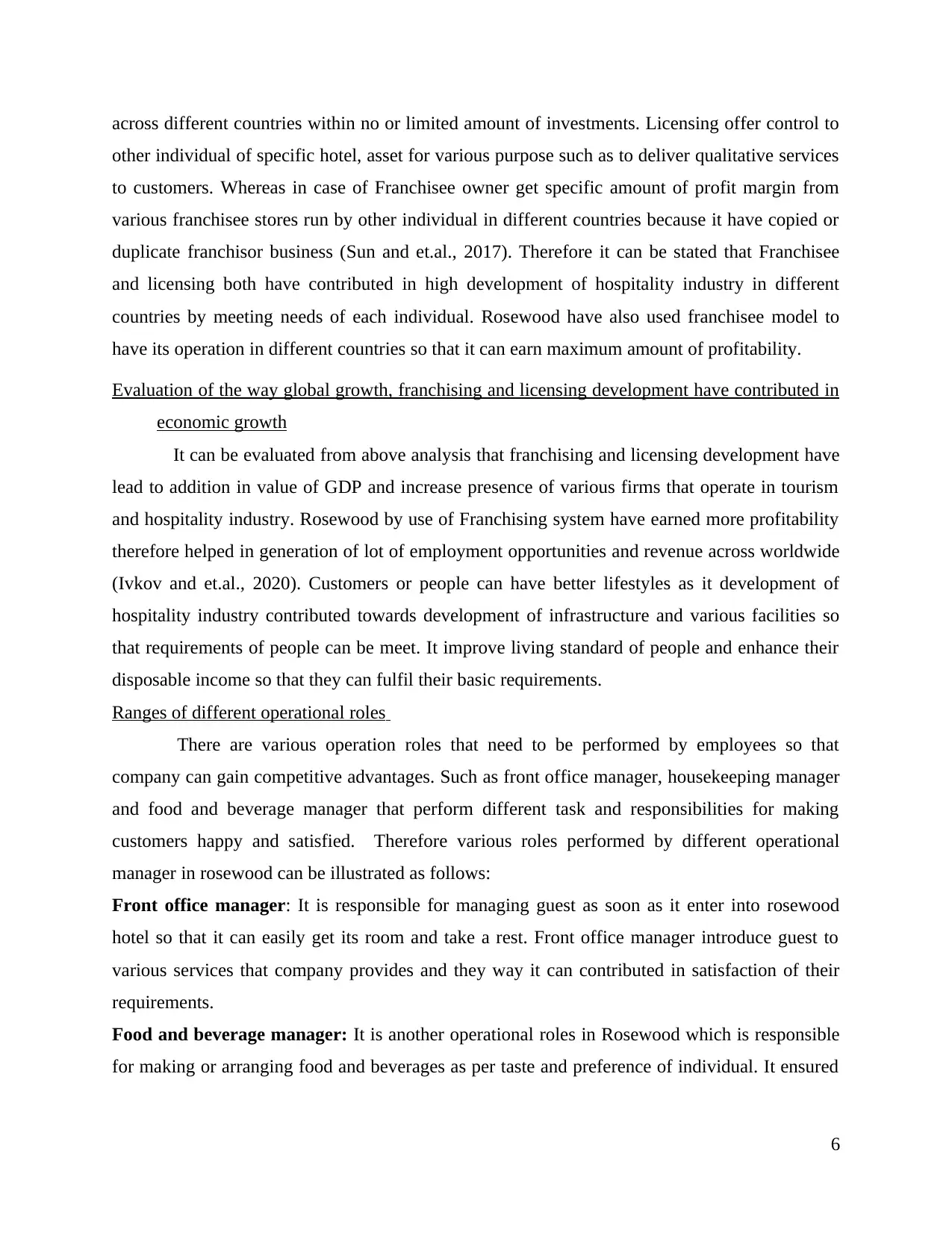
across different countries within no or limited amount of investments. Licensing offer control to
other individual of specific hotel, asset for various purpose such as to deliver qualitative services
to customers. Whereas in case of Franchisee owner get specific amount of profit margin from
various franchisee stores run by other individual in different countries because it have copied or
duplicate franchisor business (Sun and et.al., 2017). Therefore it can be stated that Franchisee
and licensing both have contributed in high development of hospitality industry in different
countries by meeting needs of each individual. Rosewood have also used franchisee model to
have its operation in different countries so that it can earn maximum amount of profitability.
Evaluation of the way global growth, franchising and licensing development have contributed in
economic growth
It can be evaluated from above analysis that franchising and licensing development have
lead to addition in value of GDP and increase presence of various firms that operate in tourism
and hospitality industry. Rosewood by use of Franchising system have earned more profitability
therefore helped in generation of lot of employment opportunities and revenue across worldwide
(Ivkov and et.al., 2020). Customers or people can have better lifestyles as it development of
hospitality industry contributed towards development of infrastructure and various facilities so
that requirements of people can be meet. It improve living standard of people and enhance their
disposable income so that they can fulfil their basic requirements.
Ranges of different operational roles
There are various operation roles that need to be performed by employees so that
company can gain competitive advantages. Such as front office manager, housekeeping manager
and food and beverage manager that perform different task and responsibilities for making
customers happy and satisfied. Therefore various roles performed by different operational
manager in rosewood can be illustrated as follows:
Front office manager: It is responsible for managing guest as soon as it enter into rosewood
hotel so that it can easily get its room and take a rest. Front office manager introduce guest to
various services that company provides and they way it can contributed in satisfaction of their
requirements.
Food and beverage manager: It is another operational roles in Rosewood which is responsible
for making or arranging food and beverages as per taste and preference of individual. It ensured
6
other individual of specific hotel, asset for various purpose such as to deliver qualitative services
to customers. Whereas in case of Franchisee owner get specific amount of profit margin from
various franchisee stores run by other individual in different countries because it have copied or
duplicate franchisor business (Sun and et.al., 2017). Therefore it can be stated that Franchisee
and licensing both have contributed in high development of hospitality industry in different
countries by meeting needs of each individual. Rosewood have also used franchisee model to
have its operation in different countries so that it can earn maximum amount of profitability.
Evaluation of the way global growth, franchising and licensing development have contributed in
economic growth
It can be evaluated from above analysis that franchising and licensing development have
lead to addition in value of GDP and increase presence of various firms that operate in tourism
and hospitality industry. Rosewood by use of Franchising system have earned more profitability
therefore helped in generation of lot of employment opportunities and revenue across worldwide
(Ivkov and et.al., 2020). Customers or people can have better lifestyles as it development of
hospitality industry contributed towards development of infrastructure and various facilities so
that requirements of people can be meet. It improve living standard of people and enhance their
disposable income so that they can fulfil their basic requirements.
Ranges of different operational roles
There are various operation roles that need to be performed by employees so that
company can gain competitive advantages. Such as front office manager, housekeeping manager
and food and beverage manager that perform different task and responsibilities for making
customers happy and satisfied. Therefore various roles performed by different operational
manager in rosewood can be illustrated as follows:
Front office manager: It is responsible for managing guest as soon as it enter into rosewood
hotel so that it can easily get its room and take a rest. Front office manager introduce guest to
various services that company provides and they way it can contributed in satisfaction of their
requirements.
Food and beverage manager: It is another operational roles in Rosewood which is responsible
for making or arranging food and beverages as per taste and preference of individual. It ensured
6
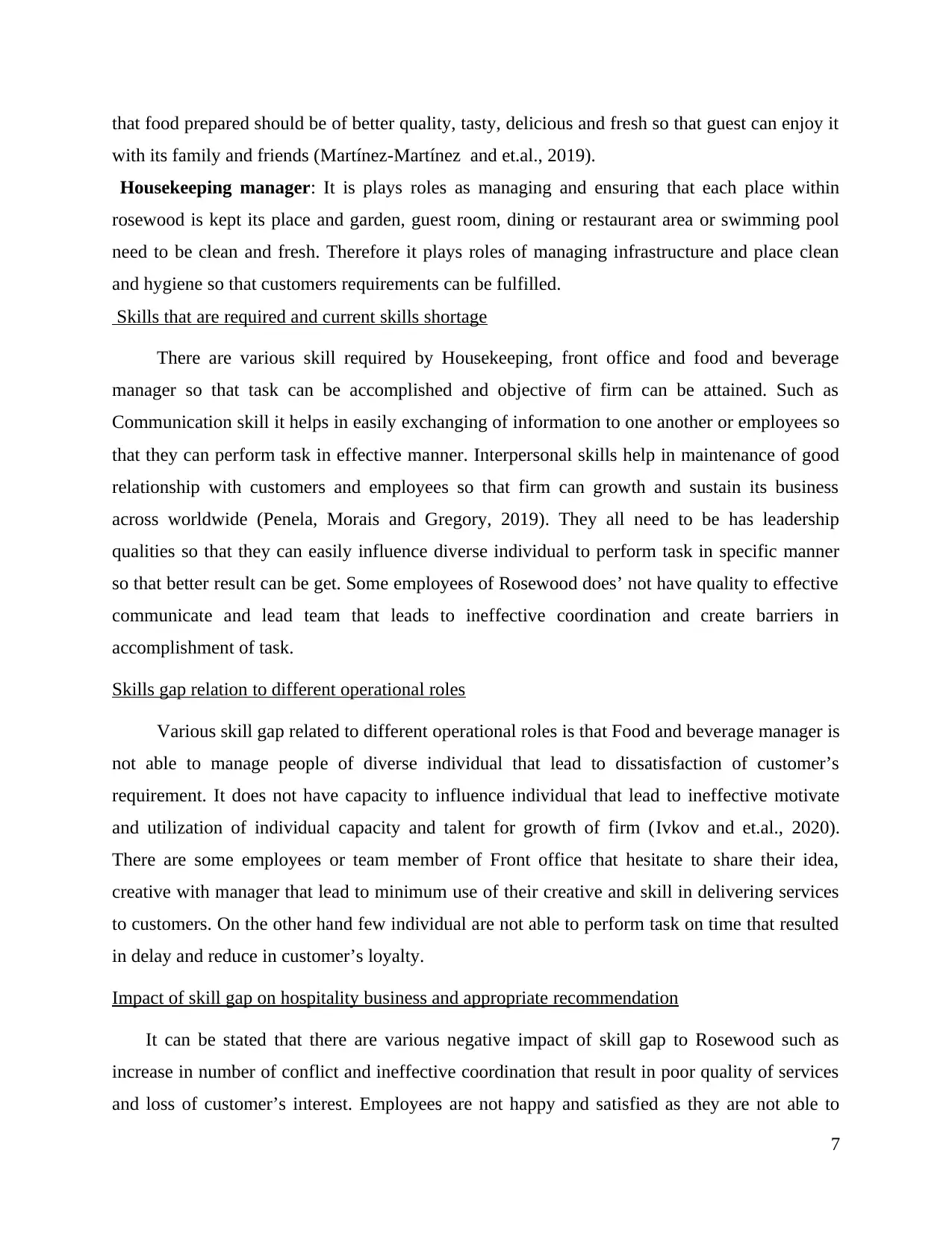
that food prepared should be of better quality, tasty, delicious and fresh so that guest can enjoy it
with its family and friends (Martínez-Martínez and et.al., 2019).
Housekeeping manager: It is plays roles as managing and ensuring that each place within
rosewood is kept its place and garden, guest room, dining or restaurant area or swimming pool
need to be clean and fresh. Therefore it plays roles of managing infrastructure and place clean
and hygiene so that customers requirements can be fulfilled.
Skills that are required and current skills shortage
There are various skill required by Housekeeping, front office and food and beverage
manager so that task can be accomplished and objective of firm can be attained. Such as
Communication skill it helps in easily exchanging of information to one another or employees so
that they can perform task in effective manner. Interpersonal skills help in maintenance of good
relationship with customers and employees so that firm can growth and sustain its business
across worldwide (Penela, Morais and Gregory, 2019). They all need to be has leadership
qualities so that they can easily influence diverse individual to perform task in specific manner
so that better result can be get. Some employees of Rosewood does’ not have quality to effective
communicate and lead team that leads to ineffective coordination and create barriers in
accomplishment of task.
Skills gap relation to different operational roles
Various skill gap related to different operational roles is that Food and beverage manager is
not able to manage people of diverse individual that lead to dissatisfaction of customer’s
requirement. It does not have capacity to influence individual that lead to ineffective motivate
and utilization of individual capacity and talent for growth of firm (Ivkov and et.al., 2020).
There are some employees or team member of Front office that hesitate to share their idea,
creative with manager that lead to minimum use of their creative and skill in delivering services
to customers. On the other hand few individual are not able to perform task on time that resulted
in delay and reduce in customer’s loyalty.
Impact of skill gap on hospitality business and appropriate recommendation
It can be stated that there are various negative impact of skill gap to Rosewood such as
increase in number of conflict and ineffective coordination that result in poor quality of services
and loss of customer’s interest. Employees are not happy and satisfied as they are not able to
7
with its family and friends (Martínez-Martínez and et.al., 2019).
Housekeeping manager: It is plays roles as managing and ensuring that each place within
rosewood is kept its place and garden, guest room, dining or restaurant area or swimming pool
need to be clean and fresh. Therefore it plays roles of managing infrastructure and place clean
and hygiene so that customers requirements can be fulfilled.
Skills that are required and current skills shortage
There are various skill required by Housekeeping, front office and food and beverage
manager so that task can be accomplished and objective of firm can be attained. Such as
Communication skill it helps in easily exchanging of information to one another or employees so
that they can perform task in effective manner. Interpersonal skills help in maintenance of good
relationship with customers and employees so that firm can growth and sustain its business
across worldwide (Penela, Morais and Gregory, 2019). They all need to be has leadership
qualities so that they can easily influence diverse individual to perform task in specific manner
so that better result can be get. Some employees of Rosewood does’ not have quality to effective
communicate and lead team that leads to ineffective coordination and create barriers in
accomplishment of task.
Skills gap relation to different operational roles
Various skill gap related to different operational roles is that Food and beverage manager is
not able to manage people of diverse individual that lead to dissatisfaction of customer’s
requirement. It does not have capacity to influence individual that lead to ineffective motivate
and utilization of individual capacity and talent for growth of firm (Ivkov and et.al., 2020).
There are some employees or team member of Front office that hesitate to share their idea,
creative with manager that lead to minimum use of their creative and skill in delivering services
to customers. On the other hand few individual are not able to perform task on time that resulted
in delay and reduce in customer’s loyalty.
Impact of skill gap on hospitality business and appropriate recommendation
It can be stated that there are various negative impact of skill gap to Rosewood such as
increase in number of conflict and ineffective coordination that result in poor quality of services
and loss of customer’s interest. Employees are not happy and satisfied as they are not able to
7
Paraphrase This Document
Need a fresh take? Get an instant paraphrase of this document with our AI Paraphraser
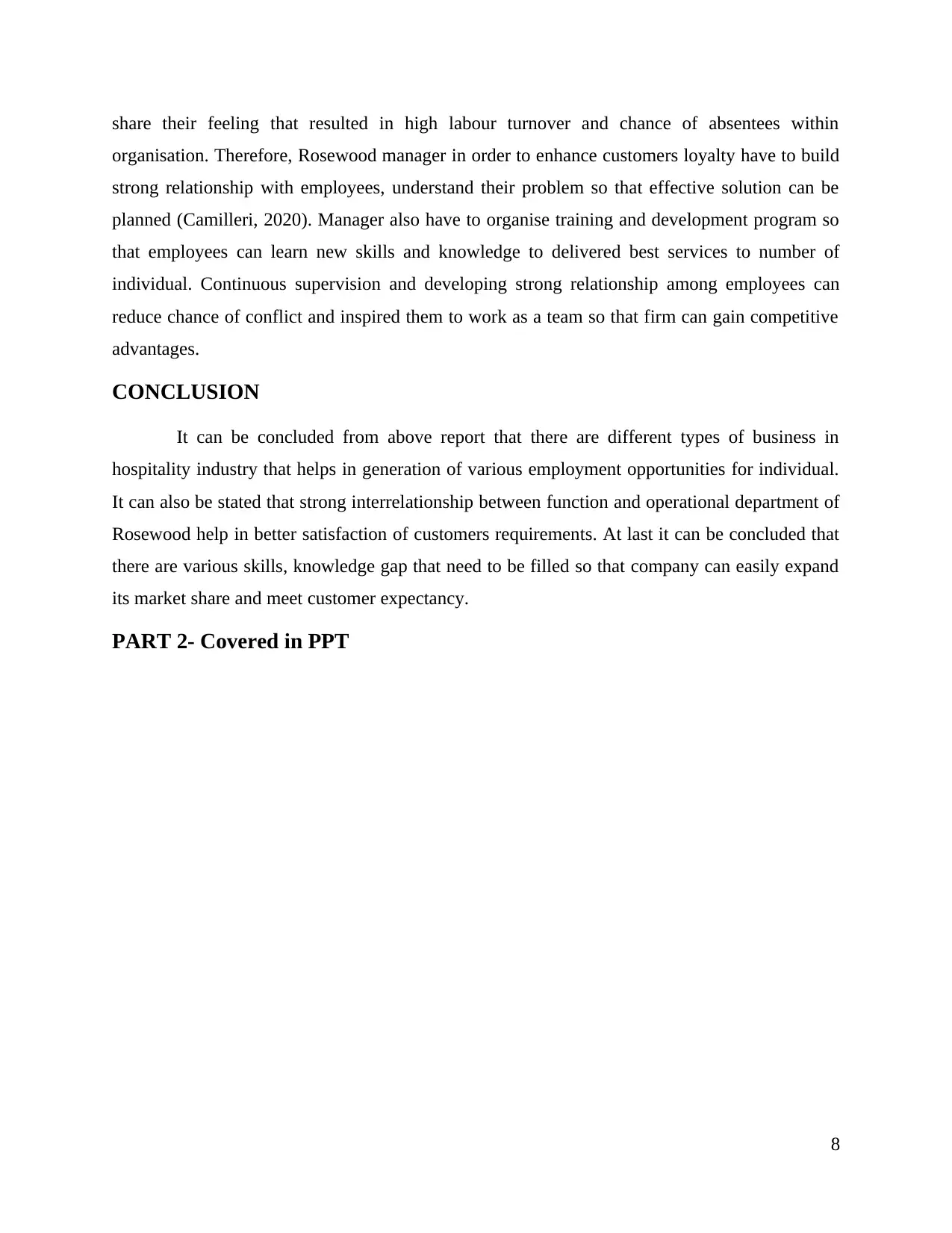
share their feeling that resulted in high labour turnover and chance of absentees within
organisation. Therefore, Rosewood manager in order to enhance customers loyalty have to build
strong relationship with employees, understand their problem so that effective solution can be
planned (Camilleri, 2020). Manager also have to organise training and development program so
that employees can learn new skills and knowledge to delivered best services to number of
individual. Continuous supervision and developing strong relationship among employees can
reduce chance of conflict and inspired them to work as a team so that firm can gain competitive
advantages.
CONCLUSION
It can be concluded from above report that there are different types of business in
hospitality industry that helps in generation of various employment opportunities for individual.
It can also be stated that strong interrelationship between function and operational department of
Rosewood help in better satisfaction of customers requirements. At last it can be concluded that
there are various skills, knowledge gap that need to be filled so that company can easily expand
its market share and meet customer expectancy.
PART 2- Covered in PPT
8
organisation. Therefore, Rosewood manager in order to enhance customers loyalty have to build
strong relationship with employees, understand their problem so that effective solution can be
planned (Camilleri, 2020). Manager also have to organise training and development program so
that employees can learn new skills and knowledge to delivered best services to number of
individual. Continuous supervision and developing strong relationship among employees can
reduce chance of conflict and inspired them to work as a team so that firm can gain competitive
advantages.
CONCLUSION
It can be concluded from above report that there are different types of business in
hospitality industry that helps in generation of various employment opportunities for individual.
It can also be stated that strong interrelationship between function and operational department of
Rosewood help in better satisfaction of customers requirements. At last it can be concluded that
there are various skills, knowledge gap that need to be filled so that company can easily expand
its market share and meet customer expectancy.
PART 2- Covered in PPT
8
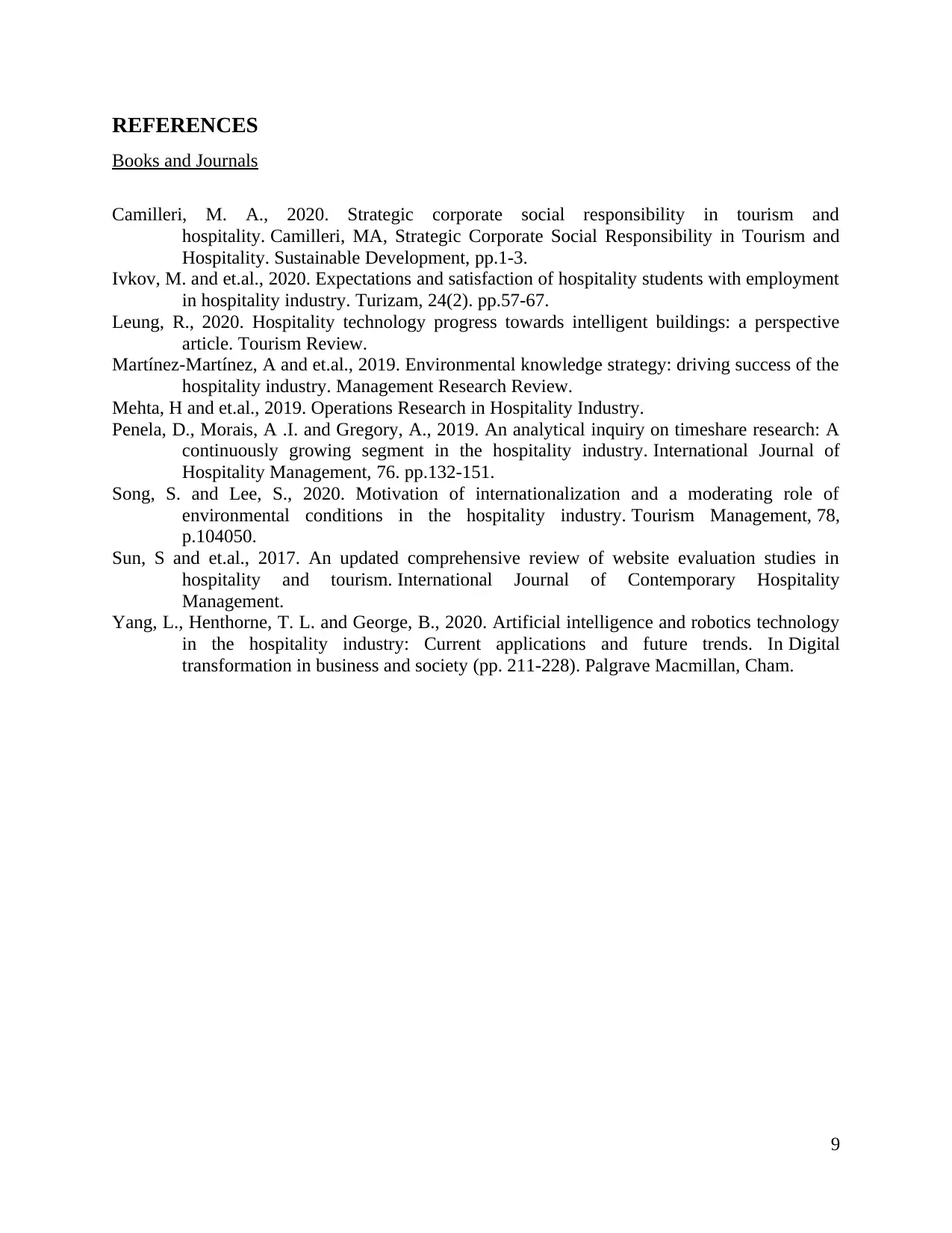
REFERENCES
Books and Journals
Camilleri, M. A., 2020. Strategic corporate social responsibility in tourism and
hospitality. Camilleri, MA, Strategic Corporate Social Responsibility in Tourism and
Hospitality. Sustainable Development, pp.1-3.
Ivkov, M. and et.al., 2020. Expectations and satisfaction of hospitality students with employment
in hospitality industry. Turizam, 24(2). pp.57-67.
Leung, R., 2020. Hospitality technology progress towards intelligent buildings: a perspective
article. Tourism Review.
Martínez-Martínez, A and et.al., 2019. Environmental knowledge strategy: driving success of the
hospitality industry. Management Research Review.
Mehta, H and et.al., 2019. Operations Research in Hospitality Industry.
Penela, D., Morais, A .I. and Gregory, A., 2019. An analytical inquiry on timeshare research: A
continuously growing segment in the hospitality industry. International Journal of
Hospitality Management, 76. pp.132-151.
Song, S. and Lee, S., 2020. Motivation of internationalization and a moderating role of
environmental conditions in the hospitality industry. Tourism Management, 78,
p.104050.
Sun, S and et.al., 2017. An updated comprehensive review of website evaluation studies in
hospitality and tourism. International Journal of Contemporary Hospitality
Management.
Yang, L., Henthorne, T. L. and George, B., 2020. Artificial intelligence and robotics technology
in the hospitality industry: Current applications and future trends. In Digital
transformation in business and society (pp. 211-228). Palgrave Macmillan, Cham.
9
Books and Journals
Camilleri, M. A., 2020. Strategic corporate social responsibility in tourism and
hospitality. Camilleri, MA, Strategic Corporate Social Responsibility in Tourism and
Hospitality. Sustainable Development, pp.1-3.
Ivkov, M. and et.al., 2020. Expectations and satisfaction of hospitality students with employment
in hospitality industry. Turizam, 24(2). pp.57-67.
Leung, R., 2020. Hospitality technology progress towards intelligent buildings: a perspective
article. Tourism Review.
Martínez-Martínez, A and et.al., 2019. Environmental knowledge strategy: driving success of the
hospitality industry. Management Research Review.
Mehta, H and et.al., 2019. Operations Research in Hospitality Industry.
Penela, D., Morais, A .I. and Gregory, A., 2019. An analytical inquiry on timeshare research: A
continuously growing segment in the hospitality industry. International Journal of
Hospitality Management, 76. pp.132-151.
Song, S. and Lee, S., 2020. Motivation of internationalization and a moderating role of
environmental conditions in the hospitality industry. Tourism Management, 78,
p.104050.
Sun, S and et.al., 2017. An updated comprehensive review of website evaluation studies in
hospitality and tourism. International Journal of Contemporary Hospitality
Management.
Yang, L., Henthorne, T. L. and George, B., 2020. Artificial intelligence and robotics technology
in the hospitality industry: Current applications and future trends. In Digital
transformation in business and society (pp. 211-228). Palgrave Macmillan, Cham.
9

10
1 out of 10
Related Documents
Your All-in-One AI-Powered Toolkit for Academic Success.
+13062052269
info@desklib.com
Available 24*7 on WhatsApp / Email
![[object Object]](/_next/static/media/star-bottom.7253800d.svg)
Unlock your academic potential
© 2024 | Zucol Services PVT LTD | All rights reserved.



